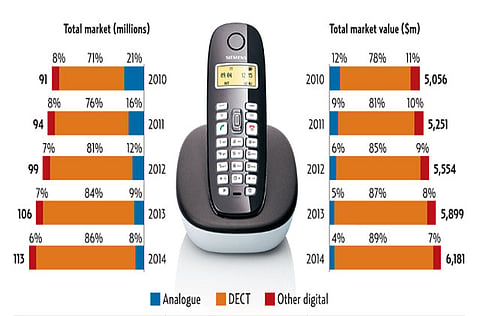Fixed-line telecom industry enjoys significant growth
Over 50% of MEA comsumers switch to advanced handsets

Dubai: The fixed-line telecom industry continues to enjoy significant growth in the Middle East and Europe as more than 50 per cent of consumers are switching to handsets with advanced features.
The development in the Middle East and Africa (MEA) region mirrors a new trend in consumer behaviour towards premium, high technology and eco-friendly cordless and corded phones. "More and more consumers in the region tend to buy sleeker phones with green credentials and higher sound quality," Shahzad Ahmad, CEO for Gigaset Communications (MEA and India), told Gulf News.
"In the last few years, we have seen our market share grow, but even we did not expect such a tremendous shift in the consumer orientation as we saw last year," he said.
The German fixed-line telephone manufacturer is gearing up to offer IP-enabled cordless phones when the Voice over Internet Protocol (VoIP) market opens up. The second largest fixed-line vendor offers this facility in Europe.
The TRA has given the green signal to both telco operators in the UAE to offer VoIP services. A major advantage of VoIP is that it avoids the tolls charged by ordinary telephone service.
Growth track
Ahmad said that unlike the myth that the fixed-line telephone market is shrinking, the company is set to grow with the VoIP policies opening up in the Middle East focusing on IP-enabled cordless phones and focusing on SOHO (small office home office) segment.
"The Gigaset's ECO DECT handsets are environmentally-friendly products. In standby mode, the phone is completely radiation-free due to ECO Plus mode. If ECO mode is set, radiation during calls is reduced by 80 per cent. Also part of this concept are energy-saving power supplies and efficient use of energy by the lithium-ion battery," he said.
Digital Enhanced Cordless Telecommunications (DECT) is a digital communication standard, which is primarily used for creating cordless phone systems.
DECT is the standard for cordless telephones. It originated in Europe, where it is the universal standard, replacing earlier cordless phone standards. It operates between 1.8GhZ-1.9 GhZ frequency. In this frequency level the interference is quite low. Not many types of equipment are working on this frequency.
The quality of communication in this range is very high. Most of the countries offer this range. Around 85 per cent of the handset sales globally is in Dect. Analogue and digital handset sales are becoming smaller and smaller.
The other two digital frequencies are 2.4Ghz and 5.8Ghz. India and China does not allow DECT. Many types of equipment operate in this range.
He said the fixed-line industry is not growing like the mobile industry. It is growing around 5 per cent annually in the region.
"When we talk of land line, customers still prefer to use corded or cordless phones than the mobile. At the same time operators are moving to offer triple play in the region.
"We have no intention of venturing into the cellphone business and our focus will be on cord and cordless telephony. We are working with telco operators in the region like STC in Saudi Arabia and etisalat in the UAE. When you apply for a triple play from etisalat, you get a Gigaset fixed-line phone and we are in field trials with du. We are currently working with Qtel in Qatar," Ahmad said.
He said as part of expansion, "we will be focusing on improving our presence in some African countries, Pakistan, Nepal, Bangladesh, Sri Lanka. We want to increase our revenues by 42 per cent this year and increase our market share to 29 per cent from 23 per cent last year."
Currently around 10 per cent is re-exported to Africa and the Middle East. Gigaset plans to raise it to 20 per cent this year.
The company is held by Arques Industries AG (80.2 per cent) and Siemens AG (19.8 per cent).


